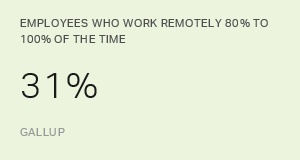Story Highlights
- It's crucial for companies to create an effective digital workplace culture
- Digital culture is even harder to get right than in-person culture
- Culture tools are only as good as the way they're used
Today's workgroups are increasingly flexible -- matrixed across projects, managers and time zones and collaborating between in-office and remote workers as well as full-time and contract workers. According to Gallup's most recent State of the American Workplace report, 31% of employees say they work remotely 80% to 100% of the time.
It's no wonder then that employee interactions -- and therefore workplace culture -- are shaped via email, Skype or Slack rather than at the proverbial water cooler of decades past.
And there are many benefits of a digital culture. It allows for a consistent experience across different offices and teams. It also allows for scalability; organizations can flex and grow while maintaining the hallmarks of their identity.
Many organizations are discovering how to take their existing culture and deliver aspects of it digitally. However, other organizations find that this transition isn't as easy as they expected.
Here are three ways that organizations can fail when they shift into digital methods of shaping and sustaining culture:
1. Providing Tools Without Expectations
A company, aware of research showing how praise is an important factor in employees' engagement, started using a digital recognition tool for its employees.
However, the company saw almost no meaningful change in engagement. What went wrong?
After analyzing the company's situation, Gallup found that only highly engaged employees were using the tool. While engaged employees were getting more engaged, disengaged employees were staying the same.
In short, the company had the tool but not the culture to support it. Unless people use the system properly -- or, in this case, use it at all -- there likely won't be meaningful change in engagement or culture.
A digital tool can make an expected behavior easier to accomplish, but it's unlikely to change underlying social behaviors -- which actually lead to an impact on the business -- by itself.
2. Implementing a One-Size-Fits-All Solution
The story above is also a great example of picking an off-the-shelf solution to solve a more complicated cultural issue. Yes, having a culture of recognition is beneficial -- if it's personalized. A digital tool alone can't do all of the work.
For example, a well-meaning company might introduce a points-and-rewards system for internal recognition, but that still leaves out the most meaningful forms of recognition.
Gallup analytics shows that the most memorable recognition comes from a manager (28%) or a high-level leader (24%). Public awards, private recognition and positive evaluations or reviews also rank high on the list of most meaningful forms of praise.
A points-and-rewards system can be a part of a culture of recognition, but every manager should determine the type of recognition that means the most to each employee. There's no autopilot, or digital substitute, for great management.
3. Forgetting to Evaluate the Return on Investment
Digital cultures allow leaders to monitor and analyze online interactions in a way that isn't possible with in-person relationships. Yet far too many organizations haven't solidified the connection between the culture they want to create and outcomes that matter to their business.
In general, recognition increases engagement. But do your organization's specific recognition rituals inspire engagement? And does that engagement lead to the retention of top-performing employees?
Most of the time, organizations already have the data they need to connect their culture initiatives to performance; they just need to take the time to conduct the linkage analysis to evaluate the investment in digital culture.
Human relationships are the foundation of great workplaces.
The future of work promises to provide employees and employers with a variety of apps, tools and metrics to make those relationships more engaging and productive.
Nevertheless, talented employees of the future will gravitate to those organizational cultures that effectively create a unique and valuable experience -- both in person and online.
Gallup can help your company create an exceptional workplace culture, both digitally and in the office.
- Learn how to build a strengths-based culture with this free, on-demand briefing.
- Create a culture that gets the best from your people through Gallup's comprehensive culture solutions.
- Bring Gallup's Leading High-Performance Teams course to your organization to help managers understand how to build an engaging environment.
- Empower employees and teams to discover and develop their strengths using Gallup's CliftonStrengths assessment.


